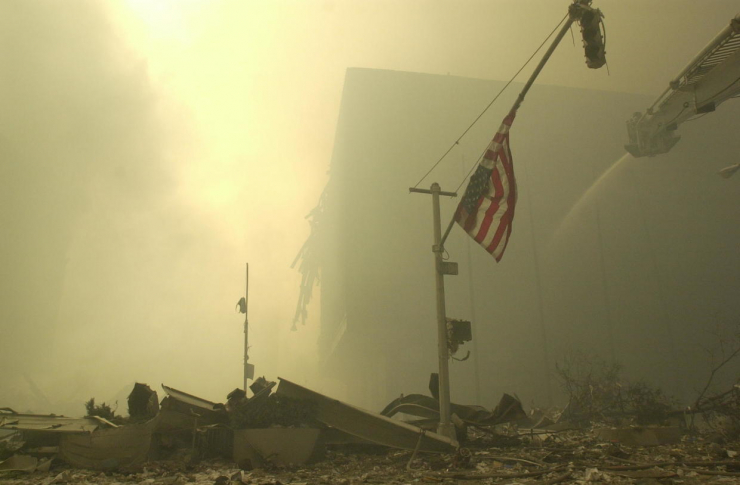
It was also a day that would stay with him not just in his memory but in a living, breathing representation of the effects of that tragedy.

The story would take years to unfold, but it began on the Wednesday morning after the Twin Towers fell, blanketing the country in a layer of despair too thick to brush away. Joe had spent the last five years of his career with the Department of Transportation and had his HAZMAT license that allowed him to carry fuel, so he volunteered to drive a truck to the site to help with refueling efforts.

He was dropped off at the Yonkers Raceway, picked up the truck with about 3,000 gallons of fuel, and made his way to Ground Zero. For more than 25 hours, he helped fill military humvees and the like, enabling them to continue search and rescue efforts long into the night and following day.
By the time his shift was over, Joe made his way back home, still covered in dust and in desperate need of a shower and some sleep.

“I really just jumped back into work and tried to carry on as normally as I could,” he said.
And that’s what he did, continuing on with the DOT, volunteering as a firefighter, and working with the Developmental Disabilities Institute in New York. But over the next few years, Joe began facing one hurdle after another, starting in 2011 with worsening pain in his bicep and shoulder.
“The doctor told me it was probably a pinched nerve, but they did an MRI and realized it was a little more serious than that,” Joe told us.

It wasn’t a simple pinched nerve – Joe was diagnosed with Multiple Sclerosis (MS), a disease in which the immune system eats away at the protective covering of nerves. In MS, resulting nerve damage disrupts communication between the brain and the body, causing many different symptoms like vision loss, pain, fatigue, and impaired coordination.
For Joe, his MS caused the biggest disruption to his gait, and his walking became unsteady and more difficult. “I kept working,” he said, “But by October 2020, I was doing too much and continuing to decline.”

By the following spring, Joe developed a blood clot in his leg. He was sent to a follow-up appointment with the hematologist, and that’s when his experience at Ground Zero re-emerged, just not in a way he could have imagined.
During his testing, doctors discovered cancer in his lung, likely a direct effect of his time spent in and around the World Trade Center site, breathing in toxic fumes and particles of dust and debris.

Not long after, surgeons successfully removed the left lower lobe of his lung.
His lung cancer and MS have made the last few years much harder on him, and much of his life is now consumed by recurrent doctor appointments (up to six each month), all over an hour away. Joe also lives by himself, which can be dangerous due to his difficulty walking and maintaining balance, and he also struggles to grasp anything with his left hand.
But Joe is a guy used to getting things done on his own, so when someone told him about an organization called ECAD (Educated Canines Assisting with Disabilities) and how a service dog might help him, he waited for over a year to call them.

When his balance worsened to the point where he required a walking cane, Joe finally decided to reach out and see if they might be able to help. That’s when he met Liz, a fundraising coach for the organization.
“Once Joe filled out an application, we interviewed him in June to see if he might be a good candidate,” Liz shared. “We ask a lot of questions – what side would the dog be on, how tall is the handler, what sort of temperament would work best, etc. Our dogs go through 1500 hours of training over 22 months, so we’re very diligent with the process to find the best fit.”

They also work with candidates on the fundraising portion, ensuring they can help cover the cost of the dog. Because the service animals are so extensively trained and critical to mobility needs, the cost can be really high. Liz mentioned that it’s also a little harder for middle-aged, non-Veteran men like Joe to fundraise – even though he’s a long-time first responder.

“He got some donors through the firehouse, but he was just slowly chipping away at the cost,” Liz explained. “I decided to look for grants for first responders, and that’s when I found Chive Charities.”
Here, we support rare medical families, Veterans, and first responders like Joe with medically-related needs not covered by insurance, including, of course, service dogs.

This time, Joe didn’t wait over a year to apply for help. We were thrilled to review his application and support this 9/11 responder and a 32-year volunteer fireman with the funds he needed to secure his service dog, thanks to our incredible donor community. We also added a halo collar and electric fence for a total impact of $28,147.
“I can’t thank you enough,” Joe said. “It’s really going to make such a big difference in my life, so to everyone who made this possible, thank you. It means a lot.”

Joe has faced a lot of hurdles in the last few years. Now, thanks to donors like you, he has the support he needs to take them on. It means everything to him – and everything to us. Join our life-changing movement to be part of the next story, and DONATE HERE.
P.S. If you’re a Veteran, military family, first responder, or rare medical individual with a medically-related need, please learn more and apply here for a life-changing grant.









































-3__small.jpg)












































































































__small.jpg)










__small.jpg)






















































































_with_flag,_jason__emily_rowley-4__small.jpg)

































































































































-2__small.jpg)



























































































































































